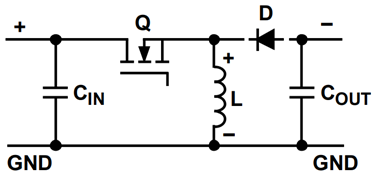Inverting Buck‑Boost Converter Calculator
Output
About Inverting Buck‑Boost Converter Calculator

The inverting buck‑boost converter provides an output voltage of opposite polarity to the input. Its voltage magnitude is related by:
\[\frac{|V_{out}|}{V_{in}} = \frac{D}{1-D}\]
which rearranges to:
\[D = \frac{|V_{out}|}{V_{in} + |V_{out}|}\]
The duty cycle (D) is then expressed as a percentage.
The inductor is chosen to limit the ripple current, using:
\[L = \frac{V_{in} \times D}{I_{ripple} \times f_{sw}}\]
(Make sure all quantities are first converted into SI units.)
Note: Enter the magnitude for Vout (a positive number) even though the converter inverts the output.
Example Calculation
Example
- Vin = 5 V
- Vout = 12 V
- fsw = 100 kHz
- Iripple = 500 mA
First, compute the duty cycle (as a fraction):
\[D_{frac} = \frac{12}{5+12} \approx \frac{12}{17} \approx 0.7059\]
which is about 70.59%.
Then, calculate the inductor value. With \(V_{in}=5\,V\), \(I_{ripple}=0.5\,A\), and \(f_{sw}=100\times10^3\,Hz\):
\[L = \frac{5 \times 0.7059}{0.5 \times 100\,000} \approx \frac{3.5295}{50\,000} \approx 7.06\times10^{-5}\,H\]
which is about 70.6 µH.
